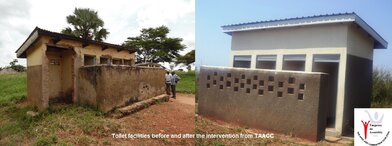Pagecontent
Fighting Corruption for better Services
The anti-corruption organisation TAACC helps children to their right to education through school service improvements in Baromo Village.
In 2016, Transparency International ranked Uganda No. 151 out of 176 countries in its annual Corruption Perception Index. Not a ranking to be proud of! Results also show that besides grand-scale theft of public funds, petty corruption involving public officials at all levels of society remains a major issue. But what does this mean in practice?
Collapse of primary education leads to investigation
A good example of the dire effects of petty corruption is the case of Baromo primary school in Oyam district in northern Uganda. For years, the school's services were in decline: Teachers were late and often missed class, the sanitation facilities were in a deplorable state, the school borehole had broken down, leaving the premises without clean water, and no electricity was available.
"The education delivery at the school had collapsed", says Tonny Okwir, Programme Manager at the Apac Anti-Corruption Coalition (TAACC), a local organisation engaged in uncovering corruption and human rights abuse in the region. TAACC decided to carry out an investigation. Isaac Ogwal, an Independent Budget Monitor trained by the organisation, recounts: "I received complaints from concerned parents of Baromo School, after which I mobilized my fellow independent budget auditors of the sub county and went to monitor education service delivery in the school. We then documented the challenges and presented our report to the TAACC management."
Based on this report, TAACC conducted an audit of the school management and uncovered blatant corruption: The former chairman of the School Management Committee and the head teacher had opened a joint account in their names, withdrawn school funds and deposited them in this private account. One of the teachers even rented out school furniture for public functions.
Investigation leads to punishment
Armed with this evidence, TAACC and some community members met with local authorities and demanded a formal audit of the school's accounting records. And when TAACC's findings were confirmed, the guilty members of the School Management Committee were arrested and ordered to refund the money. "The members of the School Management Committee and the head teacher have all been replaced with competent stuff. The school is now recovering", Tonny Okwir is happy to report.
Between January and June 2017 alone, TAACC was able to solve twelve cases of mis-appropriated funds in the sub-region and recovered almost 5,000 Euros. Not much? Maybe, but this money sure makes a difference to communities whose most basic services simply break down when it goes missing.
TAACC's funding support comes from the Democratic Governance Facility (DGF), a programme set up by the European Union together with seven other Development Partners including Austria in 2011 to foster good governance, the rule of law and democracy in Uganda.


